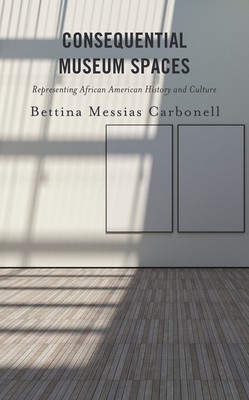
- We will send in 10–14 business days.
- Author: Bettina Messias Carbonell
- Publisher: Lexington Books
- ISBN-10: 1666919543
- ISBN-13: 9781666919547
- Format: 15.2 x 22.9 x 1.6 cm, hardcover
- Language: English
- SAVE -10% with code: EXTRA
Reviews
Description
In Consequential Museum Spaces: Representing African American History and Culture, Bettina Messias Carbonell examines how African American history and culture is-and historically has been-represented in culturally specific and mainstream museums. Carbonell argues that African American museums provide a corrective history that is both argumentative and pragmatic: these museums educate and enlighten, and they seek to effect change. Themes examined here include settlement narratives; key movements and individuals in political, social, and military history; the treatment of slavery includingthe African, transatlantic, and American slave trade and the long history of slavery as an institution in the United States; the status of Africa-the continent and individual countries and regions-as a source of origins and traditions and a destination for reconnection with the past; and activism and human rights. Carbonell considers this museum-based work in the context of relevant historical (written) texts and in the context of contemporary theories involving memory and history, corrective history, intergenerational trauma, human rights, and historical consciousness.
EXTRA 10 % discount with code: EXTRA
The promotion ends in 18d.00:26:33
The discount code is valid when purchasing from 10 €. Discounts do not stack.
- Author: Bettina Messias Carbonell
- Publisher: Lexington Books
- ISBN-10: 1666919543
- ISBN-13: 9781666919547
- Format: 15.2 x 22.9 x 1.6 cm, hardcover
- Language: English English
In Consequential Museum Spaces: Representing African American History and Culture, Bettina Messias Carbonell examines how African American history and culture is-and historically has been-represented in culturally specific and mainstream museums. Carbonell argues that African American museums provide a corrective history that is both argumentative and pragmatic: these museums educate and enlighten, and they seek to effect change. Themes examined here include settlement narratives; key movements and individuals in political, social, and military history; the treatment of slavery includingthe African, transatlantic, and American slave trade and the long history of slavery as an institution in the United States; the status of Africa-the continent and individual countries and regions-as a source of origins and traditions and a destination for reconnection with the past; and activism and human rights. Carbonell considers this museum-based work in the context of relevant historical (written) texts and in the context of contemporary theories involving memory and history, corrective history, intergenerational trauma, human rights, and historical consciousness.


Reviews